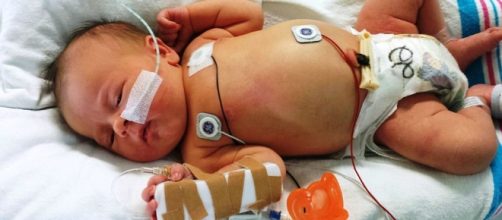Terminally-ill British infant Charlie Gard and his parents have been given permanent residency in the United States by Congress, so he can receive nucleoside therapy. An amendment was granted to allow Charlie to get medical treatment that could possibly save and improve his life. 11-month-old Charlie has been at the center of a life and death legal battle for the last 4 months between the child's parents and Great Ormond Street Hospital for Children in London.
We just passed amendment that grants permanent resident status to #CharlieGard and family so Charlie can get the medical treatment he needs.
— Jeff Fortenberry (@JeffFortenberry) July 18, 2017
Fight for Charlie
Chris Gard and Connie Yates went to the highest court possible in England, fighting for their son's life.
They asked the court to intervene with Great Ormond Street Hospital's decision to turn off Charlie's Life Support System. Charlie's parents also asked to be allowed to take their baby to the United States to receive nucleoside therapy. The fight for Charlie has gained international attention, and was commented on by both President Donald Trump and Pope Francis, which the family is very grateful for.
Doctors at Great Ormond Hospital claimed that the infant has irreversible brain damage, that the life support system should be turned off, and that Charlie should be allowed to die. The hospital told the court that the baby cannot see, open his eyes, hear, move, or respond. Charlie's parents disagreed with the findings and believe their son should be given the chance to try and improve the quality of his life.
The court hearing the case sided with the hospital, but have allowed the parents to bring in Dr. Michio Hirano, Professor of Neurology at Columbia University in NY, who is an expert in mitochondrial DNA depletion syndrome and nucleoside therapy.
Nucleoside Therapy
Dr. Michio Hirano has treated 18 patients with nucleoside therapy.
He was granted FDA approval to use the therapy for the syndrome. Nucleoside Therapy has shown promising signs in patients who are receiving treatment. Six-year-old Artuirto Estonian -- who has the TK2 strain of the syndrome -- was diagnosed at 14 months. He was the first person to begin treatment in the United States and started to show improvement within the first three months.
Charlie was diagnosed with mitochondrial DNA depletion syndrome when he was eight weeks old. The genetic order depletes and denies energy that muscles need for proper function. Patients lose the use of their limbs, become unable to eat, and eventually lose the use of their lungs and other organs. Diagnosis of the disorder is usually in infancy or young childhood when symptoms begin to appear. Charlie is the 16th person in the world to be diagnosed with the RRM2B stain of the disorder.


